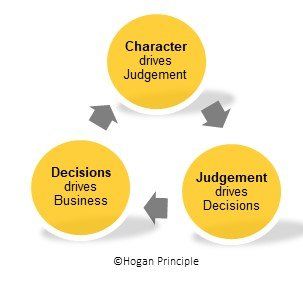Effective judgement and decision making for business
Effective judgement and decision making for business
For the last three years ABSTRACT has been researching how people make decisions.
We have looked in depth at the human brain and studied people at various levels of seniority in the Military, Financial Services, BioChem, Pharma, Sport, Media, Clinical Manufacturers, and Politics and more.
By thoroughly understanding the factors that influence decision making, we can teach people how to make the right decisions to meet their goals.
So what did we find?
Every person we spoke with when asked “how do you form judgement and make decisions?” responded – “gut-feel”, “intuition” and/or “experience”.
We used the Hogan Principle to break this down further. Hogan finds that:
We also soaked up the brilliant research by Daniel Kahneman, in his book Thinking, Fast and Slow, where he described “gut-feel” and “intuition” as fast thinking which is based on recognising the familiar and therefore ‘intuitively’ knowing how to act.
The typical person has 80,000 thoughts a day which, applying Kahneman theory, is all filed away for future reference. Applying this to the average-aged person that we spoke to in our research, means they will have had nearly 964,000,000 different experiences that will influence their ‘gut reaction’.
No wonder people find it hard to agree!
So, how do we identify the right thoughts and experiences to draw upon to reach the right decisions?
It all comes from our character.
What is character?
Whilst avoiding the nature v nurture debate, research confirms that a significant part of our character is created early on by our parents, our upbringing, our family, our community, and our education. From the age of seven this is cemented by experiences confirming our beliefs.
The word character is derived from the Greek word “charassein” which means “engrave, distinctive quality”. Each of us is unique.
Celebrating our differences
There are many character self-assessments out there and we recommend the Bolton v Bolton Persona test. It was created in the 1980s and is the basis from which many consultancies have create their own versions, using colours or animals.
In the founding theory, Bolton v Bolton suggest we are one of four primary characters – Analytical, Driver, Expressive or Amiable. ABSTRACT has developed the model further as our research confirms Driver & Expressive people are more “reward seeking” and Analytical & Amiable people are more concerned with “threat avoidance”.
The model is powerful in understanding how to effectively influence people and manage relationships.
Applying this to business
If character helps you to make decisions and decisions drive business, then you need a shared ‘organisational character’ to enable your colleagues across the business to take appropriate decisions to drive progress.
The company’s vision, purpose and values should give rise to an organisational character that gives colleagues a clear set of criteria with which to ‘instinctively’ know the right thing to do.
Executed correctly, the organisation’s character connects with, and is recognised by, its staff and customers.
The Royal National Lifeboat Institute (RNLI)
The RNLI’s vision is “to end preventable loss of life at sea” which is nigh on impossible - as any good vision should be. The RNLI purpose is “to save lives at sea” and this is possible. It is this purpose that is the daily motivation for its crew, employees and fund raising volunteers. The person who you find stood outside your supermarket on a rainy Saturday with a bright yellow RNLI donation bucket, should you ask, is saving lives at sea.
This thread of “purpose connectivity” between individuals in the RNLI, extending to the boat house stations across UK & Ireland and throughout the whole organisation, is what makes the RNLI so successful. Of course, it doesn’t mean it’s all plain sailing!
Where do we come in?
As part of our work to improve businesses through people, ABSTRACT has its own industry leading methodology, that we use with clients to review Organisational Character.
Put simply, if the organisational character is aligned with the vision, purpose and values – and those inform and guide the way the staff behave with each other and with customers - then we can move to the next stage of empowering employees with judgement and decision making.
If not, then the company has the following two options -
Recreate the Company’s Vision and Purpose to better align it to the company’s current Organisational Character (not a favourite!)
Re-engineer the Organisational Character (culture) of the company and its people to align with its Vision and Purpose (best option!)
It’s easy to say but re-engineering the Organisational Character, or company culture, is an involved process best rolled out in stages to layer up and embed the new beliefs and behaviours. It takes expertise, tenacity, patience and understanding of the different personas (Bolton v Bolton) that make up the whole. It also requires commitment and sponsorship at the highest level in the organisation.
It’s essential to include everybody in the process. They need to be a part of the journey.
People will not destroy what they helped to create.
Coming up next…
In our next article we will dive into the meaty topic of Judgement. Based on our research, most people use “gut-feel” or “intuition”, but what does this really mean and where does it come from? Take a look here >>
For further info on how we can help your team to benefit from more effective judgement and decision making, please get in touch with Nick Goddard on info@abstractuk.co.uk









